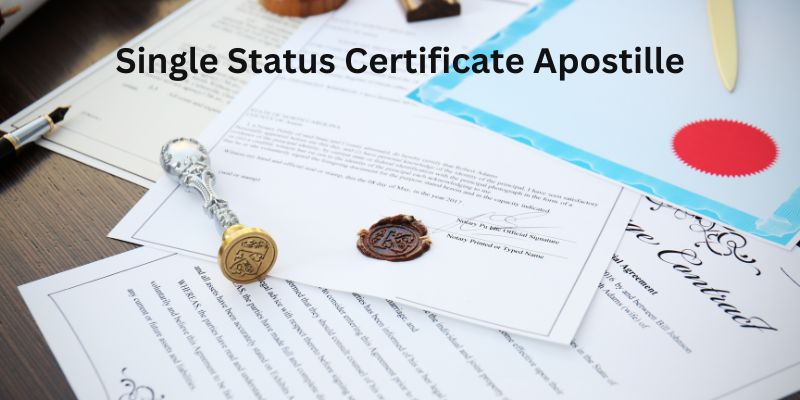International marriages and cross-border relationships have become more common than ever in a global world that is becoming more interconnected. If you are planning to get married in Europe, the Middle East, North America, or anywhere else that has strict legal requirements for foreign nationals, there is usually one document that becomes indispensable—the Single Status Certificate, which is also referred to as CENOMAR, Bachelorhood Certificate, or Certificate of No Impediment.
Though just getting that certificate is sufficient for most countries, it is not enough. In order to be legally recognized in other countries, the paper has to go through an apostille – a universally agreed upon verification for the nations which are a party to the Hague Convention of 1961. It communicates that your Single Status Certificate is authentic, still in force, and comes from the right authority in your country.
What Is a Single Status Certificate?
A Single Status Certificate is the most official and formal declaration that a person is not married and can legally enter a new marriage. Usually, this certificate is given out by a local government authority, SDM office, or home department based on the area like apostille services Mumbai, Delhi and whichever the area it is.
This documentation is necessary for foreign administrations to certify that marriages with their citizens or residents are conducted in accordance with law and that the parties involved have not been in a bigamous or falsified marital status situation.
Why Does It Need Apostille?
If you are thinking of tying the knot in a country that belongs to the Hague Convention, your Certificate of No Impediment to Marriage will have to be apostilled in order for it to be recognized by marriage registrars, departments of immigration or local authorities in a foreign country.
The apostille serves three major purposes:
- Confirms Document Authenticity: Offices performing marriage ceremonies in foreign countries require a certified copy to be a true one and that it has been issued by a bona fide Indian authority. An apostille is basically a globally accepted confirmation seal.
- Ensures Legal Acceptance Abroad: In the absence of an apostille, countries in general do not accept the processing of marriage applications. A certificate with an apostille frees the situation from doubts and secures the legal formalities to go smoothly.
- Speeds Up Immigration and Visa Processing: After wedding, couples normally file for spouse visas or family reunification visas. The use of apostilled documents is a way of not having the cases that are delayed, rejected, or that have to be submitted again.
Where Is Single Status Certificate Apostille Required?
Countries that commonly require apostille marriage certificate documentation include:
- USA
- UK
- Italy
- Spain
- France
- Germany
- Netherlands
- Australia
- New Zealand
- Japan
- South Korea
The countries mentioned abide by the rules of the Hague Convention very closely and require documents with an apostille to be submitted as a part of their legal marriage verification process.
How the Apostille Process Works
These steps generally involve:
- Getting the Single Status Certificate from the suitable authority in India.
- Local level verification, usually at the Home Department or SDM.
- Sending it to the Ministry of External Affairs (MEA) for the apostille sticker.
- If needed, translation of the document by the country of destination.
A post is a way of a document being recognized as legally binding in all the countries that are parties to the Hague Convention.
Conclusion
One Single Status Certificate Apostille step is definitely more than a mere formality—it is essentially the indispensable legal protection for your marriage abroad. It safeguards your marital rights, makes the process clear, and keeps off any troubles at the time of marriage or even later on. In case you are simply going for a wedding in another country or will be moving after marriage, getting a stamp of approval on your Single Status Certificate means you can carry on with your plans safely and smoothly.


